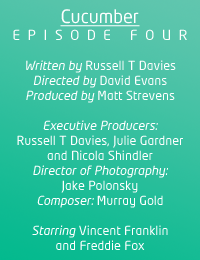This is something of an oddity, even amongst Banana episodes. Unrequited love is a topic that hasn't really been covered - it could be argued it was briefly with Josh and Sophie in episode five, but it was hardly the focus. Here, Frank ends up in a threesome with the more conventionally handsome Ben and Aidan, and pursues the latter the following morning, looking for something more.
The pair flirt with the idea for a morning - we even get to flash forward nine months - but ultimately hunky Aidan ends it. They were clearly never meant to be though, with Frank more invested from the start. At first, you think it will work out, Aidan will drop his prejudices, and they'll live happily ever after, thanks to the general shape of the series so far. But unfortunately, it isn't to be.
Instead this ends up as both a cynical and an optimistic commentary on modern society. Cynical because of its sleight against modern values, and not appreciating the opportunities we're given. Rushing into things without full consideration. Aidan just can't go out with someone that he doesn't find physically attractive, and that's fine. Some people are just like that. But so much prominence is devoted to that topic that I can't help but feel it was an intentional stab by the writer. And to address my second proposition, I find this optimistic because it tells us that any day - every day - could be day one. You might find the person you're supposed to be with any day, and that's a magical notion.
Luke Snellin's episodes seem to have been those that are slightly off-kilter for me. That's not to say they're bad, but they're certainly the exceptions of the series - if a series as varied as this can have a norm to deviate from. The final episode of the series looks to be a whopper, and I for one can't wait. This has been a very interesting series, one that's dared to push the boundaries in all the right ways, and I'm so grateful we got it. The quality of storytelling we're getting here is pretty much unparalleled in today's television landscape. Trust Davies to be the one to broaden our minds - again.
Excellently made, but lacking a certain something.























































